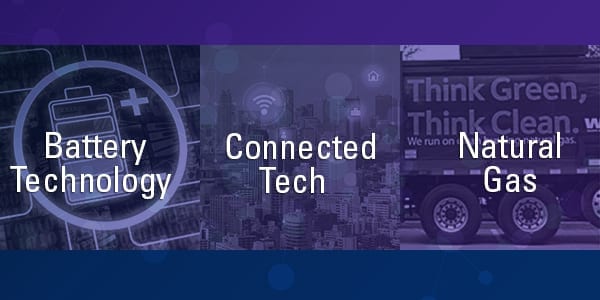Advanced Clean Transportation (ACT) Virtual is a 4-month, online education series spotlighting the latest vehicle technology and fueling infrastructure innovations that can help fleets achieve their economic and environmental sustainability goals. The first-of-its-kind virtual event series was launched following the postponement of the annual ACT Expo – North America’s largest advanced transportation and clean fleet event, which gathers attendees from around the globe at the Long Beach Convention Center each May.
ACT Virtual attendees have the opportunity to participate in 5 different advanced transportation “modules” that each feature multiple days of programming. With 14 more educational episodes planned through November 19, there is still time to secure a ticket at www.act-virtual.com.
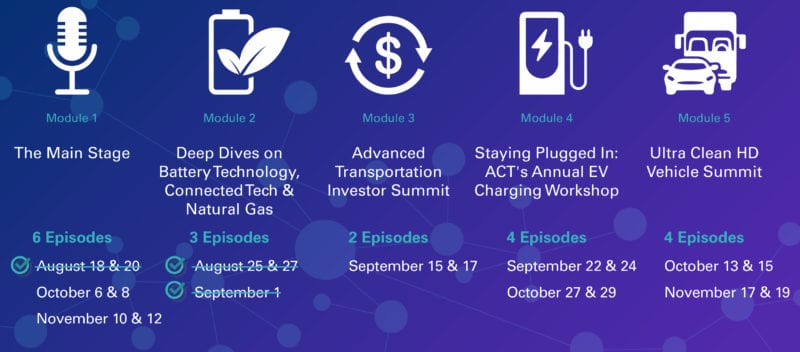
Read the Highlights from ACT Virtual Module 2:
Deep Dives on Battery Technology, Connected Tech & Natural Gas
ACT Virtual Module 2 brought together over 1,000 attendees, including leaders from top fleets throughout North America. Attendees had the ability to participate in multiple keynote presentations, breakout sessions, video networking discussions, five product debuts and technology demonstrations, and visit virtual booths.
Module 2, Episode 1 Highlights: Tuesday, August 25, 2020
Episode sponsored by: Shell, Agility Fuel Solutions, Navistar, Bauer Compressors, CalAmp, Hino Trucks, IntelliShift, Proterra, Trillium, Velocity Truck Group, Xebec
Keynote Remarks
Chintan Sopariwala, VP of Aftersales Operations and Connected Vehicles from Navistar 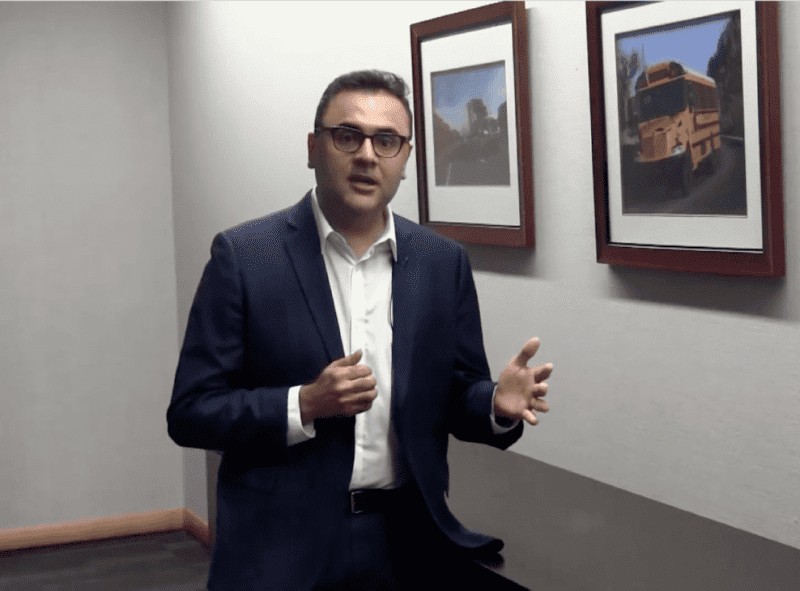
Chintan’s keynote highlighted how connected technology provides fleets the ability to save money, increase safety, improve retention, and maximize electric operations. Throughout his presentation, Chintan reiterated how essential it is for fleets keep their end goal top-of-mind and not miss the bigger picture, reminding attendees that “not all data is good data.” Key advice included:
- Emphasize the use of “actionable” data from TSPs and OEMs.
- Ensure that all systems are pulling information from a central database.
Cliff Gladstein, Founding President of GNA
Cliff delivered a keynote highlighting key results from his firm’s recently published study, “An Assessment: California’s In-State RNG Supply for Transportation: 2020-2024.” The study provides industry stakeholders and policymakers an accurate, data-driven estimate for the total near-term volume of RNG that will be produced in-state and made available for transportation use by California fleet operators.
Key findings presented included:
- By January 2024, 160 RNG production facilities will be online and will produce 119 million DGE of fuel—primarily sourced from dairy farms and landfills—enough to fuel 13,731 natural gas trucks in California annually.
- More than $1 billion is being invested in California to build the state’s supply of locally produced RNG—with 77% coming from private investors.
- California-produced RNG will have an average energy-weighted carbon intensity of -101.74 gCO2e/MJ as of January 2024.
- Fueling natural gas trucks with this upcoming supply of California-produced RNG will enable fleets to generate over 3.4 million tons of greenhouse gas emission reductions annually.
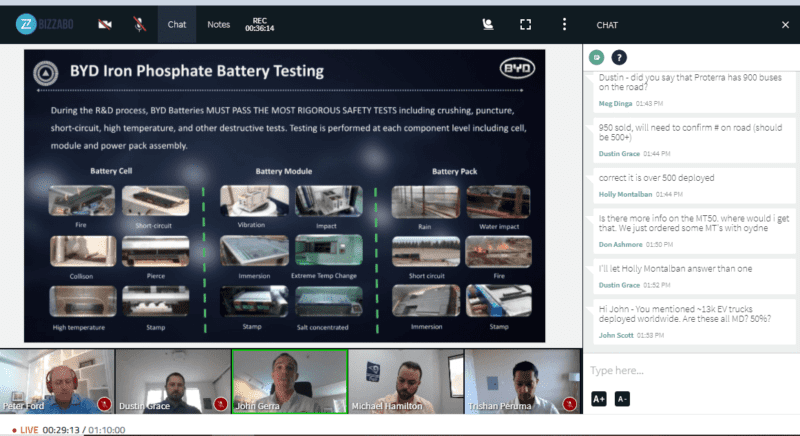
Breakout Sessions
Attendees then broke into three simultaneous sessions on connected technology, battery technology and natural gas solutions for fleet operations. Each session featured the ability to chat and ask questions via the chat box in each of the sessions—allowing attendees to engage in real-time with each other and the speakers! The breakout sessions explored the following topics:
- Battery Tech Workshop: Fleet Techniques for Safety & Prolonging Battery Life – As the demand for EVs continues to grow, so do the amount of common fleet challenges surrounding maintenance and total cost of ownership. With battery costs demanding a high price, one of the top things on fleet minds is how long that battery will last in their new EV that starts out at 2-4x the cost of an internal combustion engine vehicle. This session brought together battery technology experts from Viriciti, Proterra, BYD, and XL for an engaging discussion.
- Connected Tech Workshop: Maximizing Use of Data – Connected technology and the data it generates plays an increasingly vital role in today’s fleet management and it will be even more critical as the intelligent “fleet ecosystem” develops. Representatives from Utah DOT, Intellishift, CalAmp, and AC Transit highlighted best practice for maximizing data use.
- Natural Gas Workshop: Ready for Prime Time – With near-zero emission engine technology and ultra-low carbon renewable natural gas now dominating important segments of the heavy-duty market, this fuel and technology approach offers end-users essentially uncompromised operational performance, tremendous opportunity for cost-savings, and the lowest environmental footprint of any commercially available HD technologies. Representatives from Agility, Cummins Westport, Trillium, and NGVAmerica discussed why they believe that natural gas technology is the most economically and environmentally sustainable approach available in the HD market today and well into the future.
Technology Demonstrations
Finally, ACT would not be what it is without delivering the latest technology advancements to our fleet attendees. Attendees had the opportunity to participate in three exciting product debuts, which can be viewed here:
- Lion Electric: Purpose-Designed EV Telematic System – the Lion Beat
- Meritor: Blue Horizon ePowertrains
- Bauer Compressors: Practical Use Of IOT In A Biogas Application
Module 2, Episode 2 Highlights: Thursday, August 27, 2020
Episode sponsored by: Shell and Romeo Power Technology
Breakout Sessions 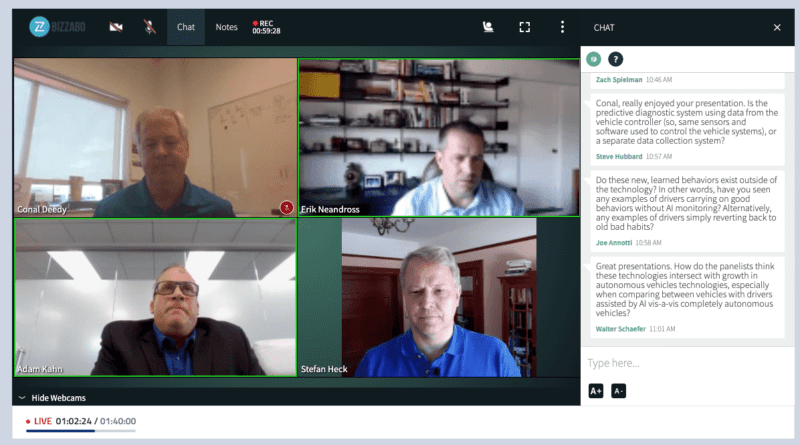
On the second day of ACT Virtual’s Module 2, attendees had the opportunity to join three separate breakout sessions as part of the natural gas, connected technology, and battery technology workshops.
- Battery Tech Workshop: Pathways to Battery Improvements – With more EV models being introduced than ever before, the race is on to find that ideal battery innovation that will curb price, reduce weight, and reach ranges not yet seen before in the industry, especially for cold weather. This session brought together experts from Romeo Power, Green Future Properties, and NREL to explore the current state of battery technologies and the improvements slated to be made to help improve the total cost of ownership.
- Connected Tech Workshop: The Power of AI – With the rise of artificial intelligence and machine learning, the often- overwhelming volume of information that accompanies new sensor and after-market part technologies is poised to be more coherent than ever before. Connected tech leaders from Volvo Trucks, Nauto, and Netradyne shared case studies and examples of using AI for data management, asset utilization, predictive maintenance, and more.
- Natural Gas Workshop: Fleets Leading on Natural Gas – With near-zero emission engine technology and ultra-low carbon renewable natural gas now dominating the heavy-duty market, this fuel and technology approach offers end-users uncompromised operational performance, tremendous opportunity for cost-savings, and the lowest environmental footprint of any commercially available HD technologies. Fleet representatives from TTSI, Akron METRO Regional Transit Authority, All Waste, and Anheuser-Busch shared why they believe that natural gas technology is the most economically and environmentally sustainable approach available in the HD market today and well into the foreseeable future.
Module 2, Episode 3 Highlights: Tuesday, September 1, 2020
Episode sponsored by: Shell and Geotab
Keynote Remarks
Sven Schulz, Chief Executive Officer of AKASOL 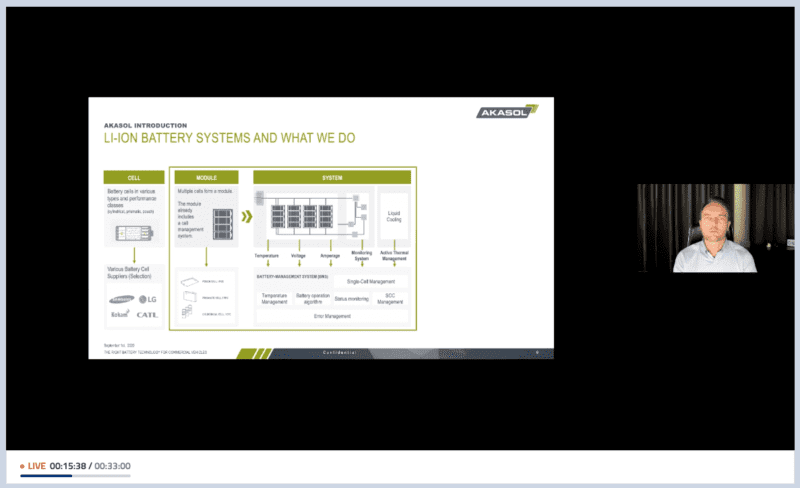
Sven kicked off the last day of the three-part module, providing an overview of the current state of battery technology and future expectations. As one of the top companies with battery technology that is actively utilized in commercial applications, AKASOL shined light on the current technology constraints, as well as short-term and long-term goals and aspirations for battery technology. This includes the ever-popular topic of the future of solid state!
Breakout Sessions
Following Sven’s keynote, attendees broke into the three separate workshops on connected tech, battery tech and natural gas for the last time.
- Battery Tech Workshop: Accelerating Second Life & Recycling: As lower-range, less advanced EVs of yesteryear come back for service or go onto their next owner, are we prepared for all the batteries that will need replacement? And where do the old batteries go? Experts from South Coast AQMD, Voltaiq, NREL, University of Birmingham, and BigBattery.com shared best practices and policy considerations needed to ensure that these vehicles and the batteries used to power them are properly recycled or prepared for a second life.
- Connected Tech Workshop: Building Architecture for the Future Fleet: Each new data system adds another layer of complexity for fleet owners and most have only begun to think about laying the foundational architecture for the connected fleet of the future. In this session, representatives from Next Trucking, Schneider, Daimler Trucks and Geotab shared where the connected fleet is headed and how to effectively integrate and interconnect ELD, GPS and other data features.
- Natural Gas Workshop: Eliminating Port Drayage Emissions Today: The Ports of LA and Long Beach are working to implement their most recent Clean Truck Program, which will impact approximately 18,000 drayage trucks. Attendees heard from AJR Trucking, Clean Energy, South Coast AQMD, and CNGVC on how this plan can be a catalyst for growth for the natural gas truck and RNG industries, and how full scale implementation of this technology can effectively eliminate port drayage truck emissions in Southern California in the near term.
Technology Demonstrations
The day wrapped up with two technology demonstrations available for ACT News readers to view here:
- Navistar: Integrating Connected Data and Service Communications to Streamline Maintenance and Repair
- Meritor: Innovations in Medium- and Heavy-Duty Electrification
5 Episodes Down, 14 to Go!
The start of ACT Virtual just a few short weeks ago has brought some much-needed energy and momentum to advance the clean transportation industry. And although it has been a long and bumpy road to transition from the in-person ACT Expo originally scheduled for May 2020 to a virtual one, we remain excited about the opportunity to continue building and advancing clean transportation technology while helping fleets achieve their economic and environmental sustainability goals.
Whether you are looking to see the latest technology firsthand, network with peers and industry leaders, or learn about the future of transportation, ACT Virtual has something for you. To learn more and to register to attend, visit ACT-Virtual.com.

